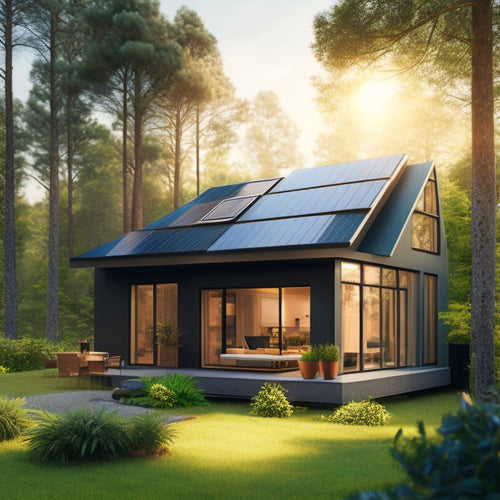
Top Home Solar Panels to Buy for Energy Efficiency
Share
You're looking for top-rated solar panels that can maximize your energy efficiency, and with conversion rates of 22% or higher achievable with high-efficiency panels, understanding the key factors that separate the best from the rest is essential. Consider brands like SunPower, Panasonic, and Tesla, which provide high conversion rates and efficient solar panels. Evaluate durability, performance, and installation options, as well as customer service and warranty features from each brand. By balancing quality with installation costs, you can optimize your return on investment and reduce energy bills over time - now, let's investigate the specifics that'll help you make an informed decision.
Key Takeaways
- Top-rated solar panel brands like SunPower, Panasonic, and Tesla offer high conversion rates and efficient solar panels for maximum energy efficiency.
- Energy output ratings above 20% indicate top-tier solar panel performance, with high-efficiency panels achieving conversion rates of 22% or higher.
- Durable solar panels with a lifespan of 30 years or more, like those from reputable manufacturers, ensure consistent energy generation over time.
- A robust warranty of 25 years or more is essential for investment protection, with some manufacturers providing longer or more comprehensive coverage.
- Balance quality of solar panels with installation costs for optimal ROI, considering factors like upfront costs, energy generation, and long-term savings.
Top-Rated Solar Panel Brands
As you begin your expedition towards utilizing the power of the sun, selecting a reliable solar panel brand is essential. You'll want to choose a brand that offers high-quality products, excellent customer service, and extensive warranties.
Top-rated brands like SunPower, Panasonic, and Tesla provide efficient solar panels with high conversion rates, ensuring you maximize your energy output. When selecting a brand, consider factors like durability, performance, and installation tips.
Look for brands that offer flexible installation options, such as roof-mounted or ground-mounted systems, to accommodate your specific needs.
Additionally, research solar incentives offered by each brand, such as rebates, tax credits, or financing options. These incentives can notably reduce the upfront cost of your solar panel system.
Energy Efficiency Comparison
When comparing home solar panels for energy efficiency, you'll want to examine energy output ratings, which measure the amount of electricity a system produces per hour of peak sunlight.
You'll also need to take into account system durability factors, such as temperature coefficient and weather resistance, which affect a system's performance over time.
Energy Output Ratings
By the time you've selected a suitable solar panel system for your home, you'll want to investigate the specifics of its energy output ratings to guarantee maximum energy efficiency.
These ratings directly impact the amount of electricity your system produces, and understanding them is vital for optimizing your energy production efficiency.
Look for solar panels with high energy output ratings, typically measured in watts (W). A higher wattage rating indicates a more efficient panel. For example, a 400W panel will produce more electricity than a 300W panel under the same conditions.
Additionally, consider the panel's efficiency rating, usually expressed as a percentage. This measures the panel's ability to convert sunlight into electricity. Top-tier solar panels boast efficiencies above 20%, while lower-end options may hover around 15%.
When evaluating energy output ratings, consider factors like temperature coefficient, which affects performance in hot climates, and maximum power point tracking, which optimizes energy production.
System Durability Factors
Your solar panel system's durability plays an important role in maintaining its energy efficiency over time. A well-maintained system guarantees peak energy output, reduces the risk of component failure, and increases the system's lifespan.
When evaluating solar panels, consider the durability of the panels, inverters, and mounting systems. Look for panels with a durable anodized aluminum frame, tempered glass, and a waterproof design.
Proper panel installation is vital to guarantee the system's durability. Make sure that your installer follows the manufacturer's guidelines and local building codes.
Regular maintenance is also necessary to prevent damage from debris, dirt, and extreme weather conditions. Follow maintenance tips such as cleaning the panels regularly, inspecting the system for signs of wear, and replacing damaged components promptly.
A durable solar panel system requires minimal repairs and replacements, resulting in long-term energy efficiency and cost savings. By considering these system durability factors, you can enjoy a reliable and efficient solar panel system that meets your energy needs.
Features to Consider Buying
As you're about to invest in home solar panels, it is essential to evaluate the features that will optimize energy efficiency and meet your specific needs. You should consider factors that impact the installation process, such as panel size, weight, and mounting options. Additionally, think about maintenance tips, like easy cleaning and monitoring capabilities, to guarantee your system runs smoothly.
| Feature | Description | Impact on Energy Efficiency |
|---|---|---|
| Panel Efficiency | Measures the percentage of sunlight converted to electricity | Higher efficiency = more power per panel |
| Inverter Type | Converts DC power to AC for home use | String inverters vs. microinverters affect system design |
| Warranty and Support | Manufacturer guarantees and customer service | Longer warranties and better support minimize fewer issues |
| Compatibility | Integration with existing electrical systems and smart home devices | Seamless integration enhances system performance |
| Monitoring and Tracking | Real-time performance monitoring and data analysis | Identifies issues and optimizes energy production |
Best Value for Your Money
Investing in home solar panels is a significant financial commitment, and getting the best value for your money is crucial. You want to confirm that your investment yields a substantial return on investment (ROI) over the years. To achieve this, you need to strike a balance between the quality of the solar panels and their cost.
When evaluating the best value for your money, consider the installation costs, panel efficiency, and warranty offered by the manufacturer. A higher-efficiency panel may cost more upfront, but it can generate more power per hour of sunlight, resulting in a faster ROI.
On the other hand, a lower-cost panel may take longer to pay back your investment. Look for manufacturers that offer competitive pricing without compromising on quality. Be wary of extremely low-cost options, as they may compromise on performance or durability.
High-Efficiency Solar Panels
From a technical standpoint, high-efficiency solar panels boast a higher power output per unit area, making them an attractive option for homeowners with limited roof space.
You'll generate more power from a smaller footprint, which can be a transformative factor for those with compact roofs. These high-efficiency panels owe their performance to recent solar technology advancements.
For instance, some panels employ advanced photovoltaic cell types like bifacial or PERC (Passivated Emitter and Rear Cell) cells.
These cells can capture energy from both the front and back sides of the panel, increasing overall energy output. Additionally, they feature improved thermal coefficient ratings, ensuring that high temperatures won't greatly impact their performance.
As a result, high-efficiency solar panels can achieve conversion rates of 22% or higher, compared to standard panels that typically range from 15% to 18%.
If you're looking to maximize your energy production without sacrificing too much roof real estate, high-efficiency solar panels are definitely worth considering.
Budget-Friendly Options Available
Beyond the high-efficiency options, budget-friendly solar panels offer an accessible entry point for homeowners looking to dip their toes into renewable energy.
If you're looking for affordable alternatives that still provide a significant reduction in your energy bills, these cost-saving solutions are worth considering.
Some notable budget-friendly solar panels include:
- Renogy 360W Monocrystalline Solar Panel: A high-quality, affordable option with a 20-year warranty.
- Panasonic 330W Solar Panel: Offers high-efficiency performance at a lower price point than premium brands.
- Jinko Solar 350W Monocrystalline Solar Panel: A budget-friendly option with a 10-year warranty and 25-year performance guarantee.
- Trina Solar 300W PolyCrystalline Solar Panel: A cost-effective option with a 25-year performance warranty.
These budget-friendly options may not offer the same level of efficiency as their high-end counterparts, but they still provide a significant reduction in energy costs and a step towards a more sustainable future.
Warranty and Durability Matters
You've investigated budget-friendly solar panel options, now it's time to examine what happens after installation. An essential aspect of your solar panel investment is warranty and durability. You want to make certain your system generates power efficiently for years to come.
When evaluating solar panels, consider the warranty coverage. Look for manufacturers that offer extensive warranties covering both the product and performance. A 25-year warranty is standard in the industry, but some manufacturers offer longer or more thorough coverage.
The solar panel lifespan is also vital. High-quality panels can last up to 30 years or more. However, the industry average is around 25-28 years.
Be wary of manufacturers with shorter lifespans or unclear durability expectations. A longer warranty and lifespan guarantee assure you'll generate power efficiently and effectively, saving you money and reducing your carbon footprint.
Frequently Asked Questions
Can I Install Solar Panels Myself to Save Money on Labor Costs?
You can attempt a DIY installation to save on labor costs, but be aware that it requires extensive electrical knowledge and may void warranties, potentially offsetting any cost savings.
How Often Should I Clean My Solar Panels to Maintain Efficiency?
As you bask in the radiant glow of your solar panels, remember that dust and grime can dim their sparkle. For ideal energy harvesting, you'll want to clean them every 6-12 months, following expert panel maintenance tips to guarantee maximum efficiency and a brighter energy future.
Do Solar Panels Work During Power Outages or Grid Failures?
During power outages or grid failures, you can maintain electricity with solar panels if you have battery storage, enabling grid independence; without it, your system will shut down for safety reasons, but you can consider upgrading to a hybrid inverter for backup power.
Can I Sell Excess Energy Generated Back to the Utility Company?
Like Robin Hood, you can take from the grid and give back, too! With net metering benefits, you can sell excess energy to the utility company, earning energy credit options that offset your consumption, and even get a refund if you produce more than you use.
Are Solar Panels Compatible With All Types of Roofing Materials?
You'll find that solar panels are compatible with most roofing materials, but it's essential to assess your roof's condition and type before installation, as solar mounting systems must be customized to guarantee secure and efficient energy harvesting.
Related Posts
-

Top 7 Portable Solar Car Battery Solutions Online
You're in luck with our selection of reliable portable solar car battery solutions that meet your needs and budget. O...
-

What Role Do Unicycles Play in Urban Transport?
As you navigate through congested city streets, unicycles emerge as a viable solution, slashing carbon emissions by u...
-

Reduce Solar Panel Cost for Your Small Home
By evaluating your energy needs, choosing the right installer, and selecting cost-effective solar panel options, you ...


